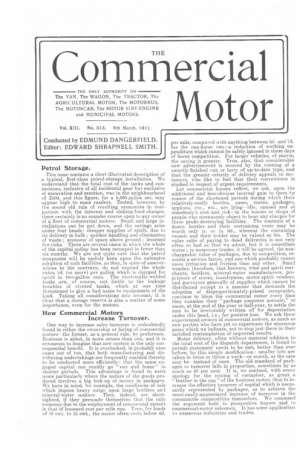Petrol Storage.
Page 1

If you've noticed an error in this article please click here to report it so we can fix it.
This issue contains a short illustrated description of -a typical, first-class petrol-storage installation. We understand that the total cost of the tanks and connections, inclusive of all incidental gear but exclusive of excavation and erection, was in the neighbourhood of £500, and this figure, for a 6,000-gallon set, may appear high to some readers. Tested, however, by the sound old rule of resulting economies in comparison with the interest and sinking-fund charges, there certainly is no sounder course open to any owner of a fleet of commercial motors. Small and large installations can be put down, and the savings arise under four heads : cheaper supplies of spirit, due to its delivery in bulk ; quicker handling and elimination of waste ; economy of space above ground ; lessened fire risks. There are several cases in which the whole of the capital outlay has been recouped in fewer than six months. We are not quite sure that the petrol companies will be unduly keen upon the extensive adoption of such facilities, as they, in spite of asseverations to the contrary, do not expend the whole extra Id. (or more) per gallon which is charged for spirit in two-gallon cans. The electrically-welded tanks are, of course, not liable to the leakage troubles of riveted tanks, which at one time threatened to give a bad name to equipments of the kind. Taking all considerations into account, it is clear that a storage reserve is also a matter of some importance, even for the motors.
How Commercial Motors Increase Turnover.
One way to increase sales turnover is undoubtedly found in either the ownership or hiring of commercial motors—the former, as a general rule, by preference. Business is aided, in more senses than one, and it is erroneous to imagine that new custom is the only consequential benefit. It is overlooked, in probably nine cases out of ten, that both manufacturing and distributing undertakings are frequently enabled thereby to be conducted more efficiently : thatthe same engaged capital can readily go "out and home" in shorter periods. This advantage is found to exist more particularly where the nature of the goods produced involves a big lock-up of money in packages. We have in mind, for example, the conditions of sale which impose heavy outgo upon large bottlers and mineral-water makers. They, indeed, are shortsighted, if they persuade themselves that the only
• economy due to the employment of commercial motors is that of lessened cost per mile run. True, For loads of 10 cwt. to 15 cwt., the motor often costs below 4d. per mile, compared with anything between 5d. and 7d. for the one-horse van--a reduction of working ex penditure which cannot be safely ignored in these days of fierce competition. For larger vehicles, of course, the saving is greater. True, also, that considerable new advertisement is secured by the running of a smartly-finished van or lorry of up-to-date type, and that the greater celerity of delivery appeals to customers, who like to feel that their convenience is studied in respect of urgent requirements. Let commercial houses reflect, we ask, upon the additional and less-obvious internal gain to them by reason of the shortened periods during which their relatively-costly bottles, cases, crates, packages, syphons, etc., etc., are lying—idle, unused and at somebody's cost and risk—in the houses or shops of people who strenuously object to bear any charges for these profit-destroying facilities. The contents of a dozen bottles and their restraining crate may be • worth only is. or Is. 6d., whereas the containing vessels and their•holder may be valued at 30s. The value ratio of paying to dead deliveries is not very often so bad as that we admit, but it is sometimes worse ; in numerous trades, it will be agreed, the non chargeable value of packages, due to competition, re mains a serious factor, and one which probably causes more irritation and friction than any other. Small wonder, therefore, that brewers, wine and spirit mer chants, bottlers, mineral-water manufacturers, proprietors of stores, laundrymen, motor-spirit vendors, and purveyors generally of supplies which cannot be distributed except in a manner that demands the adoption of disproportionately-priced receptacles, continue to bless the commercial motor every time they examine their "package suspense account," or come, at the end of the year or half-year, to settle the sum to be irrevocably written off for depreciation under this head, i.e., for positive loss. We ask these experienced owners of commercial motors, as much as new parties who have yet to experience the enormous gains which we indicate, not to stop just there in their satisfied contemplation of improved results. Motor delivery, often without material addition to the total cost of the dispatch department, is found to permit customers' needs to be met, better than ever before, by this simple modification : smaller lots are taken in twice or thrice a week—or month, as the case
may be—instead of once. The old standard of pack
ages to turnover falls in proportion, sometimes by as much as (30 per cent. It is, we contend, with every apology for the mixing of metaphor, as great a "feather in the cap" of the business motor, thus to increase the effective turnover of capital which is neces sarily represented by packages, as to achieve the more-easily-appreciated increase of turnover in the consumable commodities themselves. We commend the argument both to prospective buyers anc110 commercial-motor salesmen. It has some application to numerous industries and trades.


























